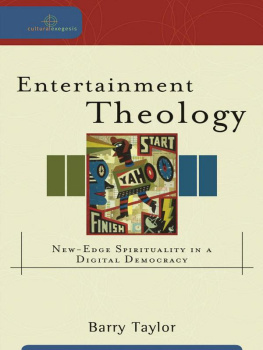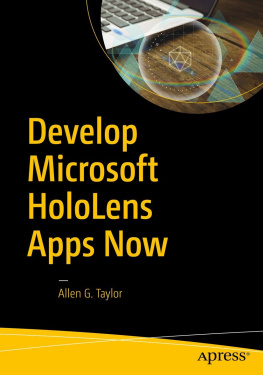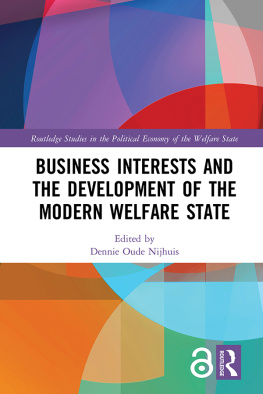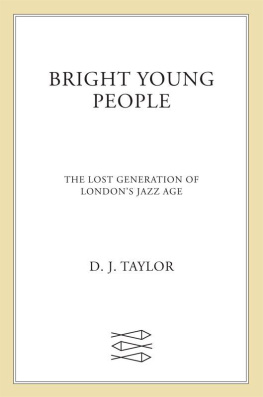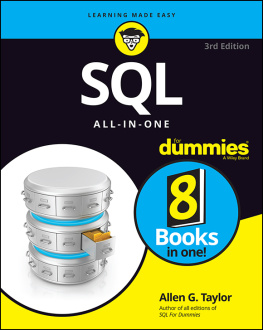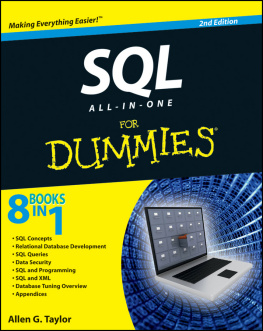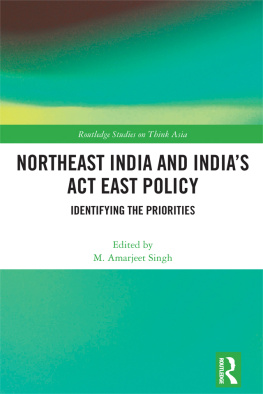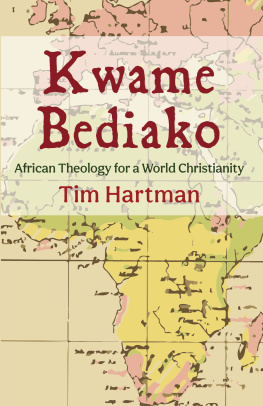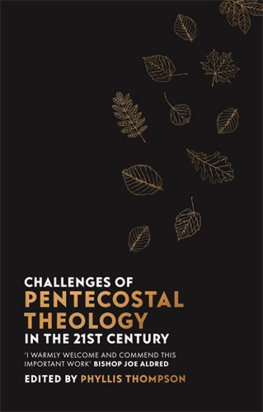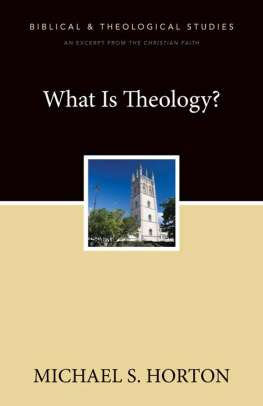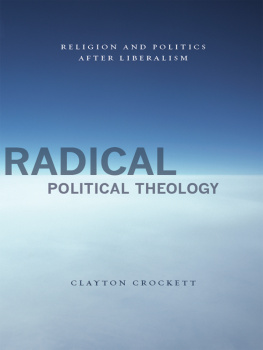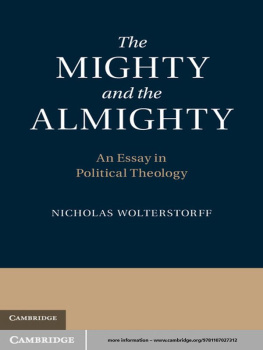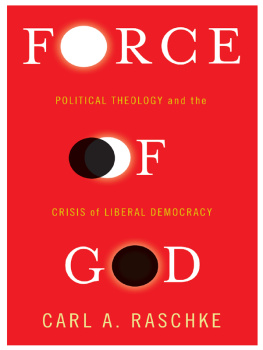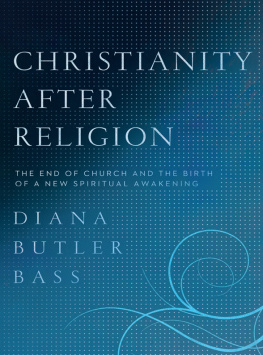Entertainment
Theology

William A. Dyrness
and Robert K. Johnston, series editors
The Cultural Exegesis series is designed to complement the Engaging Culture series by providing methodological and foundational studies that address the way to engage culture theologically. Each volume works within a specific cultural discipline, illustrating and embodying the theory behind cultural engagement. By providing the appropriate tools, these books equip the reader to engage and interpret the surrounding culture responsibly.
Entertainment
Theology
New-Edge Spirituality in a Digital Democracy
Barry Taylor

2008 by Barry Taylor
Published by Baker Academic
a division of Baker Publishing Group
P.O. Box 6287, Grand Rapids, MI 49516-6287
www.bakeracademic.com
Printed in the United States of America
All rights reserved. No part of this publication may be reproduced, stored in a retrieval system, or transmitted in any form or by any meansfor example, electronic, photocopy, recording without the prior written permission of the publisher. The only exception is brief quotations in printed reviews.
Library of Congress Cataloging-in-Publication Data
Taylor, Barry, 1956
Entertainment theology : new-edge spirituality in a digital democracy / Barry Taylor.
p. cm. (Cultural exegesis)
Includes bibliographical references.
ISBN 978-0-8010-3237-0 (pbk.)
1. Popular cultureReligious aspectsChristianity. 2. Christianity and culture.
I. Title.
BR115.C8T38 2008
201'.7dc22
2007042069
Scripture is taken from the HOLY BIBLE, NEW INTERNATIONAL VERSION. NIV. Copyright 1973, 1978, 1984 by International Bible Society. Used by permission of Zondervan. All rights reserved.
To everyone, everywhere, I have ever met, thank you.
Whenever they enter a new era of history, people
change their ideas of both humanity and divinity.
Karen Armstrong
Contents
God-Talk in the Postsecular: Missional Theology for a Radically
Different World
I found a note in one of my journals referencing a Talmudic tradition that urged Jewish scholars to acknowledge the sources of their ideas in order to bring redemption to the world. I had no quotes or sources beside the note, but I wanted to honor this tradition and name a few of the many people who have helped me, either through their works or via personal interaction. It was Picasso, I believe, who said something like, Good artists borrow; great artists steal. Many of the ideas in this book find their genesis in the thinking and writing of others, and I would like to give them the credit and gratitude they deserve. The endnotes and bibliography will alert the reader to influential works and sources, but I wanted to mention a few in a more direct and personal manner.
Graham Ward, Walter Truett Anderson, Karen Armstrong, and Douglas Rushkoff form the backbone of my overall thinking about religion, culture, and change throughout this book. Each helped me coalesce my thinking and provided me with categories to work in and through. They each inhabit different fields of study, but there was a convergence in their writings that I found to be of great assistance in pinning down some of the dynamics I was exploring. I should single out Wards True Religion and Rushkoffs Playing the Future as key works in this area.
On the theological front, I must acknowledge a deep debt to John Drane, John Caputo, Mark I. Wallace, Roger Haight, and Leonardo Boff. It was not always the answers they offered as much as the questions they raised that were of the most benefit to me. John Drane has been a mentor for many years, and his generous and thoughtful interactions have helped me more than I can say. His insights into the dynamics of faith and cultural change have been central to much of my thinking in this book and go well beyond the references cited.
John Caputos book, The Weakness of God, is a seminal work for me. His idea about weak theology not only gave me the freedom to approach Scripture and institution in new ways but also has become central to my own theological grid. Leonardo Boffs commitment to what he terms eco-theologya holistic and integrated view of human life that seeks to collapse the compartmentalization of religion and spirituality from the rest of lifehas become an inspiration for my own life and relation to creation. I have read his small work, Global Civilization, countless times in the past year or so and have found it very helpful when attempting to understand the implications of technological change in an increasingly global society. Mark I. Wallace and Roger Haight have also assisted in the formation of my own theological opinions, and their thinking influences much of what emerges throughout the present book.
I also need to say something about Slavoj iek, Gianni Vattimo, and Ken Wilber, whose outside voices helped me look at Christianity in new ways. After Christianity, Gianni Vattimos provocative book that offers an alternative future for Christian faith, influenced the final portion of this book. iek has much to say about Christianity and religion in general, and the fact that he is not a believer only made his thinking on the subject more helpful to me. Ken Wilber, whose theory of integral spirituality has gained a lot of cultural traction in recent years, was very helpful in the middle section of this book where I tried to gather some of the shifting dynamics in the world of faith into categories, as was Walter Truett Andersons book The Next Enlightenment, which made sense of the new developments in the relation between science and faith.
I must also say a word about Rob Johnston, who is one of the editors of the series in which this book appears but who is first and foremost a great friend and an always-thoughtful conversation partner. He has been supportive and helpful in my academic journey and has always challenged me to clarify my positions and perspectives. There is no particular work of his I drew on in this book, but our conversations were many and his help goes beyond cited materials.
I realize that this list is incomplete; many others could and should be added. But I offer this naming as a symbolic gesture about the genesis of ideas and thinking in my own life and work and as a mark of respect to all whose giftedness and creativity has marked me and makes me who I am.
For the times they are a-changin.
Bob Dylan, 1963
Things have changed.
Bob Dylan, 2000
There is a new mood in the air, a new interest in religion and the nature of belief and their role in what it means to be human. It is a realization, emerging in Western culture particularly, that the old values that have informed and shaped us for the past few hundred years are lacking in their ability to meet the deep yearning of the human heart. It is the recognition that the Enlightenment view (which held that scientific rationalism was the only viable means to the realization of full humanity) is, in fact, sorely limited in its scope and that our commitment to it has left us barren and adrift. It is also an acknowledgment that the balance of power has shifted in the culture. A growing number of people are increasingly unwilling simply to accept the pronouncements of institutions, whether they be religious, political, or otherwise, and are instead looking to themselves, to their peers, and particularly to alternative resource centers, such as Internet Web sites and contemporary media, in order to create new means for grappling with questions of ultimate reality. This is not to say that the day of traditional institutions is over, but it is to say that those institutions no longer have the last word or hold the authoritative sway they once did.
Next page
